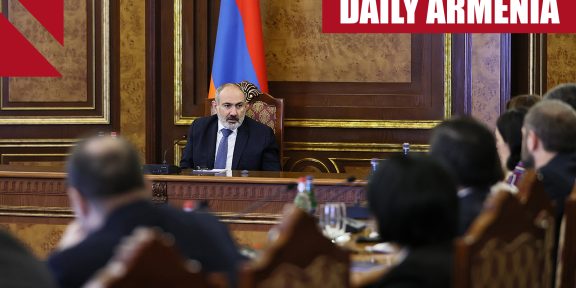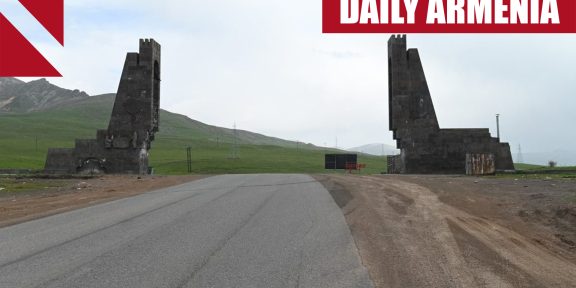This week on Insights, host Eric Hacopian analyzes Armenian Prime Minister Nikol Pashinyan’s unprecedented eight-hour marathon question and answer session with the public. He discusses what it shows about Armenia’s democratic development and priorities. Eric then looks at the reactions from Azerbaijani President Ilham Aliyev regarding Armenia’s military acquisitions. Hacopian provides context and insights into the strategic communications behind these political dynamics unfolding in the South Caucasus.
Ilham, Thou Protest Too Much
-
Building a powerful Armenian identity
Renowned British comedian Kev Orkian joins Patrick on the Civilnet podcast to share his insights as an Armenian in the Diaspora. They discuss the importance of remembering the Armenian Genocide and crafting a hopeful vision for the future. In a wide-ranging conversation, Orkian also offers his perspectives on cultivating Armenian pride, changing negative mindsets, and creating a compelling narrative to empower the nation.
-
Never Forget, Never Repeat: Commemorating the Armenian Genocide
On this week’s Insights, host Eric examines the upcoming departure of EU Special Representative Toivo Klaar from his role in the South Caucasus. He analyzes what led to this change and considers its potential implications. The episode also touches on the ongoing recognition efforts for the 109th anniversary of the Armenian Genocide, keeping alive observations on justice and remembrance of the past.
-
New reports emerge of damage to Armenian heritage in Karabakh
Ani Avetisyan Several reports showing visual evidence of the damage or complete demolition of cultural and religious sites in Nagorno-Karabakh emerged in the past week. Among the destructed areas are the cemetery of Shushi near the Ghazantschetsots church, the Kanach Zham church also in Shushi and, more shockingly, the entire village of Karintak. Threats to Armenian cultural heritage in Azerbaijan have been voiced by a number of politicians, experts and organizations. In one of its several provisional measures, the International Court of Justice demanded that Azerbaijan take steps to protect the Armenian cultural sites in its territory, and punish the […]
-
Demonstrators block roads to protest planned border demarcation
Controversy is raging over the Armenian government’s agreement with Azerbaijan to demarcate parts of the border which critics call a unilateral withdrawal from territory by Armenia. Residents of the affected area in Tavush have risen in protest, blocking vital roads and demanding a stop to the process. This CivilNet special report breaks down what you need to know about this developing story.
-
Inside CFTJ’s demand for Azerbaijan to be investigated for genocide
The Center for Truth and Justice, a U.S.-based nonprofit, formally asked the International Criminal Court to investigate Azerbaijan’s leaders for genocide last week, marking the first such petition to the tribunal since Armenia joined earlier this year. CivilNet’s Mark Dovich traveled to The Hague, Netherlands, to observe the proceedings and hear firsthand from the CFTJ team about their groundbreaking work.















